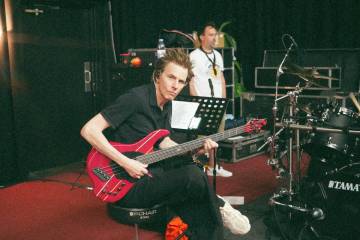After starting as one man’s band, the Motet now united in funk
When you look up "motet," it's listed as "a highly varied choral musical composition" by Wikipedia, "one of the pre-eminent polyphonic forms of Renaissance music."
The Motet, meanwhile, is something else entirely, a furious funk band out of Boulder, Colorado. While the act's handle doesn't neatly fit the strict definition, the handle wasn't really meant to be evocative, according to the outfit's founder and longtime leader, Dave Watts.
"I would have groups around Colorado, the Dave Watts Trio, the Dave Watts Quartet, Dave Watts Quintet," Watts explains. "Eventually, I was like, 'I'm just going to change the poster to say 'Motet,' so then I don't have to make a new poster every time I get a different lineup.'"
The band's name has since become singular with its sound, which has progressed profoundly over the years, thanks to the vision, tenacity and direction of Watts, a Berklee College of Music alumnus. While attending school in Boston, the timekeeper became a member of a group called Shockra. Thanks to some shared contacts provided by Phish, which played shows in the same regional house-party circuit, Shockra headed out west for a handful of tours.
Somewhere around the fourth time through, Watts says, he fell in love with the place and decided to stay. "I didn't see any reason why I needed to travel 2,000 miles to get to Colorado," Watts recalls. "Besides being just a gorgeous natural environment, I knew I could make a living as a musician. It's very dog-eat-dog on the East Coast, especially in Boston back in those days. And so I came to Boulder. I was just blown away by how much support for music there was, and I figured why not come out and be a big fish in a small pond, you know. It's amazing how much it's grown since then."
The same can be said for the music of the Motet, which started with a jazzy fusion sound that has since organically grown into finely tuned funk. The band has become a powerhouse by building up a faithful fan base at home and then extending its reach with favorable festival slots and steady touring. Founded by Watts in the late '90s, the group was originally more of a makeshift affair with different members filling a lineup built around Watts, a drummer with a fondness for Fela Kuti.
With the exception of the band's forthcoming album and its eponymous predecessor from 2014, Watts has essentially served as the Motet's sole creative director. The act's sound has steadily progressed with each album, with the most dramatic directional shift coming on the aptly titled "Dig Deep" from 2009. That release found Watts experimenting with Ableton, software that allows the user to manipulate the music, and pushing into more electronic territory. The progression of the album, which features Dominic Lalli, the sax player who went on to form Big Gigantic, actually led Watts in search of a greater groove, first with Juno What?!, an electro funk outfit he founded with Motet keyboardist Joey Porter, and to a greater extent on the Motet's next release.
"We all started experimenting with that stuff, but there was so much noise with all the DJs and whatnot that it felt like we could make more of an impression just getting back to our roots with music and just getting back to songwriting," he says. "Getting back to playing grooves instead of experimenting with all the sounds. It's kind of exciting when you have Ableton to experiment with all the sounds, but after a while, you kind of step back and say, 'Oh yeah. What about songs and grooves and live music. You know? It's way more satisfying, this place that we're in now, as far as I'm concerned."
The place where the Motet is now is playing straightforward funk. "Our whole bag is mid- to late-'70s, early '80s funk," Watts explains. "That's just where we're sitting these days. We love it."
The Motet's stylistic change was inspired indirectly by its annual Halloween shows. Over the past 15 years, the outfit has performed classic material from the likes of Stevie Wonder, Prince, Earth Wind & Fire, Sly and the Family Stone, Parliament-Funkadelic and more. "If you look at all the Halloween shows we've done over the years, it's right in the pocket of what we love the best," Watts points out. "It's that vibe, man. We love it, and we really embraced it, and it's stronger than ever, if you look at our writing and our live show.
"It's a style that comes from an era that I think really was the pinnacle of great pop music," adds Watts, speaking of the influence that funk had on him overall as a musician. "That era of the '70s had so much great music with lots of vocals, soul, lots of focus on the groove, big horn sections, percussion, multiple guitar keys. It was just a big sound. It was rhythmic, which satisfied the drummers need to be rhythmic. And then, at the same time, it allows for improvisation, which we've always wanted to include in our sound and our live show. So for me, funk music has it all."
Armed with the idea that "these songs are so great and so powerful and make such a great impression, why don't we just write our own," Watts and company set about writing original tunes in that vein. The results could be heard on 2014's stellar self-titled release, which featured a static lineup — Watts and Porter, plus bassist Garrett Sayers, guitarist Ryan Jalbert, trumpeter Gabe Mervine, tenor sax player Matt Pitts and vocalist/percussionist Jans Ingber — with every member contributing to the songwriting, rather than just Watts.
"We really consider it a strong point of the band that we can get together and collaborate as a group and really come up with ideas that we can get behind and grow as a band," he says of the outfit's newfound dynamic. "All we need is a spark, you know, just one little idea. I'll just come in with a groove — not even a bassline, just a groove — and it will grow from there. So really all we need is time and space to get together and feel it out, and the tunes just blossom.
"I think we've just gotten tighter," says Watts of how the unit has grown since then. "The last record really enabled us to get on the road more. We played a lot of dates this summer. So I just think the rhythm section is tighter than ever, the horn lines are funkier and the vocals are strong. It's just the whole thing is jelling and it's easier to be creative. So we're able to knock out tunes quicker and able to put together more involved compositions."
A new album is in the works, according to Watts. Recorded at the Parlor Recording Studio in New Orleans by Eric Krasno of Soulive and Lettuce, the platter is due out this summer in time for the outfit's triumphant homecoming gig at Red Rocks with Medeski, Martin & Wood in July. Playing at the storied mountainous amphitheater is a crowning achievement for any band, but it's even more of an honor for an independent homegrown act like the Motet. Watts agrees, of course, but that was never even a consideration when he first started the band, he says.
"That wasn't necessarily the goal," Watts says. "It was really to try and make as good of music as possible. We love Colorado so much — we all love Colorado so much — it's not like we're looking for an excuse to get out, but we realize that it's gotten so big and we're doing so well with it that we need to expand outside of Colorado. It wasn't necessarily the goal to be headlining Red Rocks. It was more just a goal of making the best music possible, and one thing led to another."
That's the textbook definition of improv. Well, more or less.
— Read more from Dave Herrera at reviewjournal.com. Contact him at dherrera@reviewjournal.com and follow @rjmusicdh on Twitter.




























